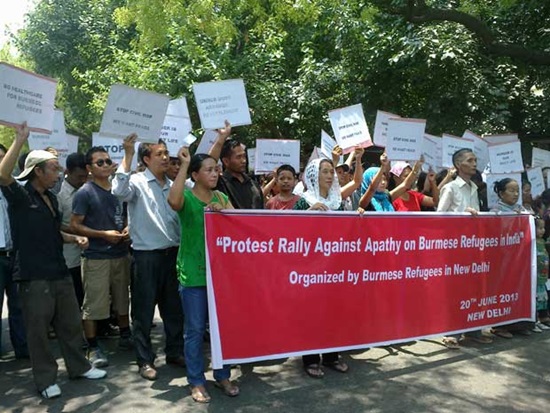Guwahati: Burmese refugees, mostly from Chin province of Burma (Myanmar) often demonstrate in the national capital of India with their various demands primarily some basic facilities recommended by the UN.
Over 300 Burmese taking shelter in New Delhi had lastly taken out a rally in the capital city on the World Refugees Day (20 June) and urged the UNHCR to ‘increase the number of resettlements for Burmese refugees and expedite the process’. The protest programme was organized by Delhi Chin Community Fellowship (DCCF) under the banner of Burmese Refugees in India.

The DCCF, in a statement issued during the demonstration, alleged that the Burmese refugees in Delhi are facing ‘numerous hardships in their day to day survival due to lack of financial, legal aid, healthcare and educational assistance’.
“In Burma, our home country, we were harassed and tortured by Burmese Army and here in Delhi (India), we face difficulties of livelihood. Also the role of the UNHCR New Delhi office is not satisfactory in terms of support for the Burmese refugees,” said the statement signed by the DCCF president Tin Duhthang and its secretary Hrang Auchhunga. “We are not in a position to send our children to school. Our women are harassed and raped by local peoples. When we approached the Police, UNHCR and its implementing partner organization like Women Protection Center, Don Bosco and Social and Legal Information Center to report on such cases we were humiliated and 99% of cases were not registered,” asserted the statement.
Mentionable is that some changes are taking places in Burma under the new quasi-civilian government headed by the President U Thein Sein. Under the guise of ‘Democratic Change and Perpetual Peace’ in Burma, the present regime has made some reforms like cease fire to resolve the internal problems and deal with the ethnic nationality.
However the civil war continues with most of the armed ethnic groups including conflict in Kachin State. The Burmese political observers argue that the ongoing cease fire with many armed groups in Burma without the sustained peace process would be meaningless. There should (must) be some inclusive political dialogues including the collective political will of all ethnic groups to resolve the prolonged political problems. The government efforts for peace is politically unsound since political problems are not solved, military constitution are not amended as well as the military role in State politics and suppression of constitutional ethnic rights are not curbed, said the DCCF officials.
The agitating Burmese refugees shouting slogans like we want justice, we need protection, stop human rights violations, no more harassments, UNHCR arrange resettlement, we are helpless refugees etc even denied to repose faiths on the present government at Naypyidaw in the present context.
Later more than 400 Burmese refugees signed the statement which is to be sent to UNHCR headquarter in Geneva, informed M Kim, a Burmese activist based in New Delhi. He pointed out that as a result of undemocratic rules, civil wars and the long-standing hostilities by the previous military governments the ethnic populations have suffered a lot.
Very often the ethnic people have been perceived as the enemies of the country and also treated them as second class citizens. Hence the agitating refugees put a challenge to the present regime of Burma to initiate some steps with an aim to get the confidence of the common people.
Their primary demands include to amend the 2008 Burma constitution in accordance with peoples’ desire, to declare nationwide ceasefire and initiate for inclusive and meaningful political dialogues with various ethnic groups.
The Burmese refugees in India also expressed disappointment that they have not seen any ‘genuine efforts’ to resolve various issues by the present government, rather they have noticed that the human rights violations especially in the ethnic areas only increase and continue the negative tendency.


